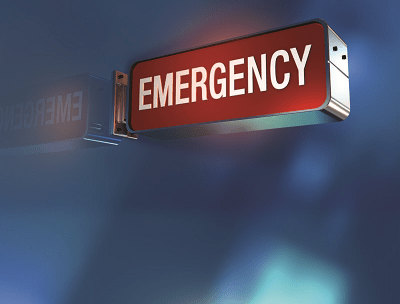

What symptoms should send you to the ED?
“Often, the patient can sense when something significant is going on with their health,” says Dr. Fontanetta. “Don’t worry if you come in and it turns out to be nothing. We are as happy with that outcome as the patient is.”
An injury like a broken bone or a deep cut is, of course, an obvious call for an ED visit. Dr. Fontanetta also offers these general guidelines:
Go to the ED If You Have ...
CHEST PAIN: If the pain is a type you haven’t had before, particularly if it makes you anxious or is associated with shortness of breath or sweating. “That being said, we are there to make an evaluation. If you’re concerned, come in so that we can do the appropriate tests,” says Dr. Fontanetta.
FEVER: If it is higher than 101° or accompanied by shaking and chills, which could be a sign of an infection that has moved to the bloodstream. For children, go if fever is accompanied by lethargy or other unusual behavior.
BREATHING PROBLEMS: Any time a person has breathing problems, especially if they have a chronic respiratory issue such as asthma or COPD, call 911. Emergency responders can help stabilize a patient with medication and oxygen even before the patient gets to the ED.
ABDOMINAL PAIN: If pain is accompanied by a fever or is localized to one area of the abdomen, such as the upper right, lower right or lower left quadrant; or is accompanied by severe vomiting and diarrhea so that the patient becomes dehydrated.
A BLOW TO THE HEAD: If the person was stunned or lost consciousness; if they are taking blood thinners; if they are elderly; if they have symptoms such as weakness, numbness, or vision problems.
STROKE OR NEUROLOGICAL SYMPTOMS: If any new and different neurological symptoms occur, such as weakness or numbness in any part of the body or a change in vision, call 911 and get to the ED as quickly as you can.
“Whenever you come to the ED, whether it’s 7 p.m. or 4 a.m.,” says Dr. Fontanetta, “you will receive the same high level of care. We are here for the community 24/7.”
In an emergency, call 911. To find a doctor at Clara Maass Medical Center, call (888) 724-7123 or visit Find a Doctor.